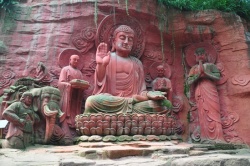Difference between revisions of "Third turning of the wheel"
| Line 1: | Line 1: | ||
[[File:0hjjfjf3l14.jpg|thumb|250px|]] | [[File:0hjjfjf3l14.jpg|thumb|250px|]] | ||
<poem> | <poem> | ||
| − | Third turning of the wheel - Vajrayana can also be seen as the third of the three "turnings of the wheel of dharma": | + | [[Third turning of the wheel]] - [[Vajrayana]] can also be seen as the third of the three "[[turnings of the wheel]] of [[dharma]]": |
| − | In the first turning Shakyamuni Buddha taught the Four Noble Truths at Varanasi in the 5th century BC, which led to the founding of Buddhism and the later early Buddhist schools. Details of the first turning are described in the Dhammacakkapavattana Sutta. The oldest scriptures do not mention any further turnings other than this first turning. | + | In the first turning [[Shakyamuni Buddha]] taught the [[Four Noble Truths]] at [[Varanasi]] in the 5th century BC, which led to the founding of [[Buddhism]] and the later [[early Buddhist schools]]. Details of the first turning are described in the [[Dhammacakkapavattana Sutta]]. The oldest [[scriptures]] do not mention any further turnings other than this first turning. |
| − | The Mahayana tradition claims that there was a second turning in which the Perfection of Wisdom sutras were taught at Vulture's Peak, which led to the Mahayana schools. Generally, scholars conclude that the Mahayana scriptures (including the Perfection of Wisdom Sutras) were composed from the 1st century CE onwards. | + | The [[Mahayana tradition]] claims that there was a second turning in which the [[Perfection of Wisdom sutras]] were taught at [[Vulture's Peak]], which led to the [[Mahayana]] schools. Generally, [[scholars]] conclude that the [[Mahayana scriptures]] (including the [[Perfection of Wisdom Sutras]]) were composed from the 1st century CE onwards. |
| − | According to the Vajrayana tradition, there was a third turning which took place at Dhanyakataka sixteen years after the Buddha's enlightenment. Some scholars have strongly denied that Vajrayana appeared at that time,[5] and placed it at a much later time. The first tantric (Vajrayana Buddhist) texts appeared in the 3rd century CE, and they continued to appear until the 12th century. | + | According to the [[Vajrayana tradition]], there was a third turning which took place at [[Wikipedia:Dharanikota|Dhanyakataka]] sixteen years after the [[Buddha's]] [[enlightenment]]. Some [[scholars]] have strongly denied that [[Vajrayana]] appeared at that [[time]],[5] and placed it at a much later [[time]]. The first [[tantric]] ([[Vajrayana]] [[Buddhist]]) texts appeared in the 3rd century CE, and they continued to appear until the 12th century. |
</poem> | </poem> | ||
{{W}} | {{W}} | ||
Revision as of 05:45, 5 April 2014
Third turning of the wheel - Vajrayana can also be seen as the third of the three "turnings of the wheel of dharma":
In the first turning Shakyamuni Buddha taught the Four Noble Truths at Varanasi in the 5th century BC, which led to the founding of Buddhism and the later early Buddhist schools. Details of the first turning are described in the Dhammacakkapavattana Sutta. The oldest scriptures do not mention any further turnings other than this first turning.
The Mahayana tradition claims that there was a second turning in which the Perfection of Wisdom sutras were taught at Vulture's Peak, which led to the Mahayana schools. Generally, scholars conclude that the Mahayana scriptures (including the Perfection of Wisdom Sutras) were composed from the 1st century CE onwards.
According to the Vajrayana tradition, there was a third turning which took place at Dhanyakataka sixteen years after the Buddha's enlightenment. Some scholars have strongly denied that Vajrayana appeared at that time,[5] and placed it at a much later time. The first tantric (Vajrayana Buddhist) texts appeared in the 3rd century CE, and they continued to appear until the 12th century.
